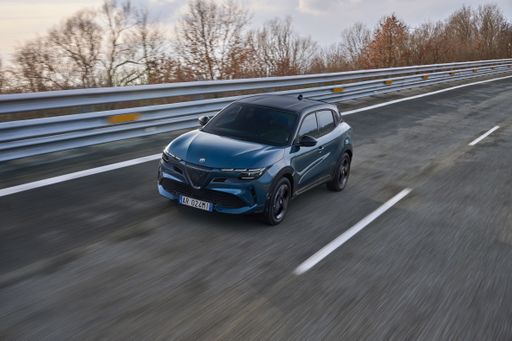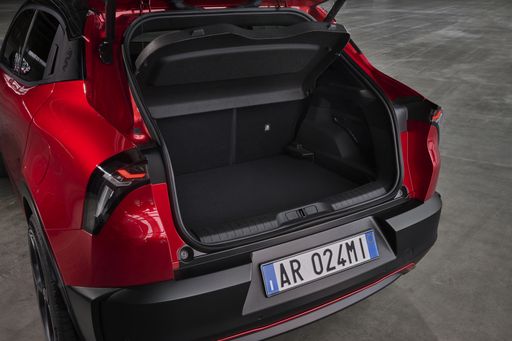Alfa Romeo Junior vs SsangYong Torres – Which model is better for everyday use?
Everyday use, family trips or long-distance drives – here’s where the differences show.
Discover whether Alfa Romeo Junior or SsangYong Torres fits your lifestyle better.
Costs and Efficiency:
When it comes to price and running costs, the biggest differences usually appear. This is often where you see which car fits your budget better in the long run.
Alfa Romeo Junior has a evident advantage in terms of price – it starts at 25700 £, while the SsangYong Torres costs 33800 £. That’s a price difference of around 8177 £.
Fuel consumption also shows a difference: Alfa Romeo Junior manages with 4.80 L and is therefore decisively more efficient than the SsangYong Torres with 7.90 L. The difference is about 3.10 L per 100 km.
In terms of energy consumption, the advantage goes to the Alfa Romeo Junior: with 15.10 kWh per 100 km, it’s distinct more efficient than the SsangYong Torres with 18.70 kWh. That’s a difference of about 3.60 kWh.
As for range, the SsangYong Torres performs a bit better – achieving up to 462 km, about 52 km more than the Alfa Romeo Junior.
Engine and Performance:
Under the bonnet, it becomes clear which model is tuned for sportiness and which one takes the lead when you hit the accelerator.
When it comes to engine power, the Alfa Romeo Junior has a evident edge – offering 280 HP compared to 207 HP. That’s roughly 73 HP more horsepower.
In terms of top speed, the Alfa Romeo Junior performs barely noticeable better – reaching 206 km/h, while the SsangYong Torres tops out at 194 km/h. The difference is around 12 km/h.
There’s also a difference in torque: Alfa Romeo Junior pulls minimal stronger with 345 Nm compared to 339 Nm. That’s about 6 Nm difference.
Space and Everyday Use:
Beyond pure performance, interior space and usability matter most in daily life. This is where you see which car is more practical and versatile.
Both vehicles offer seating for 5 people.
In curb weight, Alfa Romeo Junior is barely noticeable lighter – 1380 kg compared to 1498 kg. The difference is around 118 kg.
In terms of boot space, the SsangYong Torres offers convincingly more room – 703 L compared to 415 L. That’s a difference of about 288 L.
In maximum load capacity, the SsangYong Torres performs evident better – up to 1662 L, which is about 382 L more than the Alfa Romeo Junior.
When it comes to payload, SsangYong Torres distinct takes the win – 552 kg compared to 420 kg. That’s a difference of about 132 kg.
Who comes out on top?
Overall, the Alfa Romeo Junior shows itself to be shows small but notable strengths and secures the title of DriveDuel Champion.
It convinces with the more balanced overall package and proves to be the more versatile choice for everyday use.
 @ Alfa Romeo / Stellantis Media
@ Alfa Romeo / Stellantis Media
Alfa Romeo Junior
Alfa Romeo Junior
The Alfa Romeo Junior captures the essence of Italian design with its sleek lines and compact dimensions, making it an icon of elegance and performance. With a spirited driving experience and a charming retro aesthetic, it appeals to enthusiasts and casual drivers alike. This delightful car embodies the brand's rich heritage while remaining a fun and engaging option for those seeking a unique automotive experience.
details @ Alfa Romeo / Stellantis Media
@ Alfa Romeo / Stellantis Media
 @ Alfa Romeo / Stellantis Media
@ Alfa Romeo / Stellantis Media
 @ Alfa Romeo / Stellantis Media
@ Alfa Romeo / Stellantis Media
SsangYong Torres
The SsangYong Torres stands out with its rugged design and robust stance, ideal for adventure enthusiasts seeking a reliable companion for off-road escapades. Inside, the vehicle offers a spacious and comfortable cabin equipped with modern features to enhance the driving experience. Its performance is geared towards delivering a smooth ride, making it versatile for both city driving and rural trails.
details
 @ Alfa Romeo / Stellantis Media
@ Alfa Romeo / Stellantis Media
|
|
|
|
|
Costs and Consumption |
|
|---|---|
|
Price
25700 - 41600 £
|
Price
33800 - 44600 £
|
|
Consumption L/100km
4.8 - 5.4 L
|
Consumption L/100km
7.9 - 9.1 L
|
|
Consumption kWh/100km
15.1 - 17.5 kWh
|
Consumption kWh/100km
18.70 kWh
|
|
Electric Range
344 - 410 km
|
Electric Range
462 km
|
|
Battery Capacity
0.4 - 51 kWh
|
Battery Capacity
-
|
|
co2
0 - 119 g/km
|
co2
0 - 207 g/km
|
|
Fuel tank capacity
44 - 45 L
|
Fuel tank capacity
50 L
|
Dimensions and Body |
|
|---|---|
|
Body Type
SUV
|
Body Type
SUV
|
|
Seats
5
|
Seats
5
|
|
Doors
5
|
Doors
5
|
|
Curb weight
1380 - 1689 kg
|
Curb weight
1498 - 1618 kg
|
|
Trunk capacity
340 - 415 L
|
Trunk capacity
703 L
|
|
Length
4173 mm
|
Length
4700 mm
|
|
Width
1781 mm
|
Width
1890 mm
|
|
Height
1505 - 1538 mm
|
Height
1710 mm
|
|
Max trunk capacity
1205 - 1280 L
|
Max trunk capacity
1662 L
|
|
Payload
390 - 420 kg
|
Payload
552 kg
|
Engine and Performance |
|
|---|---|
|
Engine Type
Electric, Petrol MHEV
|
Engine Type
Petrol, Electric
|
|
Transmission
Automatic
|
Transmission
Manuel, Automatic
|
|
Transmission Detail
Dual-Clutch Automatic, Reduction Gearbox
|
Transmission Detail
Manual Gearbox, Automatic Gearbox, Reduction Gearbox
|
|
Drive Type
Front-Wheel Drive, All-Wheel Drive
|
Drive Type
Front-Wheel Drive, All-Wheel Drive
|
|
Power HP
136 - 280 HP
|
Power HP
163 - 207 HP
|
|
Acceleration 0-100km/h
5.9 - 9.1 s
|
Acceleration 0-100km/h
-
|
|
Max Speed
150 - 206 km/h
|
Max Speed
191 - 194 km/h
|
|
Torque
230 - 345 Nm
|
Torque
280 - 339 Nm
|
|
Number of Cylinders
3
|
Number of Cylinders
4
|
|
Power kW
100 - 207 kW
|
Power kW
120 - 152 kW
|
|
Engine capacity
1199 cm3
|
Engine capacity
1497 cm3
|
General |
|
|---|---|
|
Model Year
2024 - 2025
|
Model Year
2023 - 2024
|
|
CO2 Efficiency Class
A, C, D
|
CO2 Efficiency Class
G, A
|
|
Brand
Alfa Romeo
|
Brand
SsangYong
|
What drive types are available for the Alfa Romeo Junior?
Available configurations include Front-Wheel Drive or All-Wheel Drive.
The prices and data displayed are estimates based on German list prices and may vary by country. This information is not legally binding.
